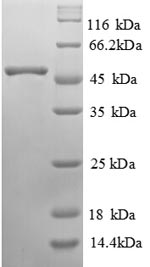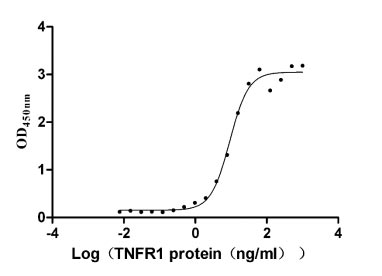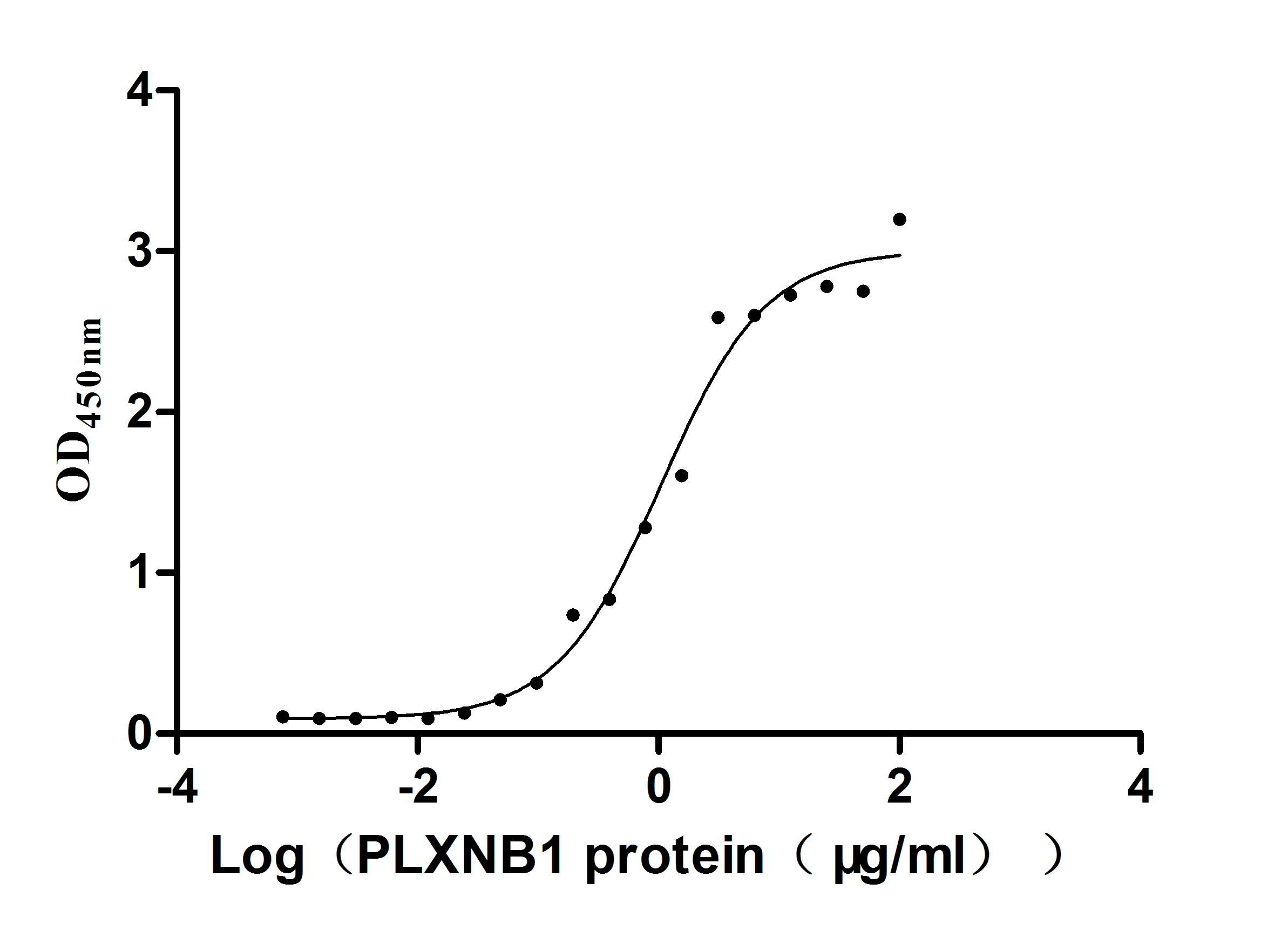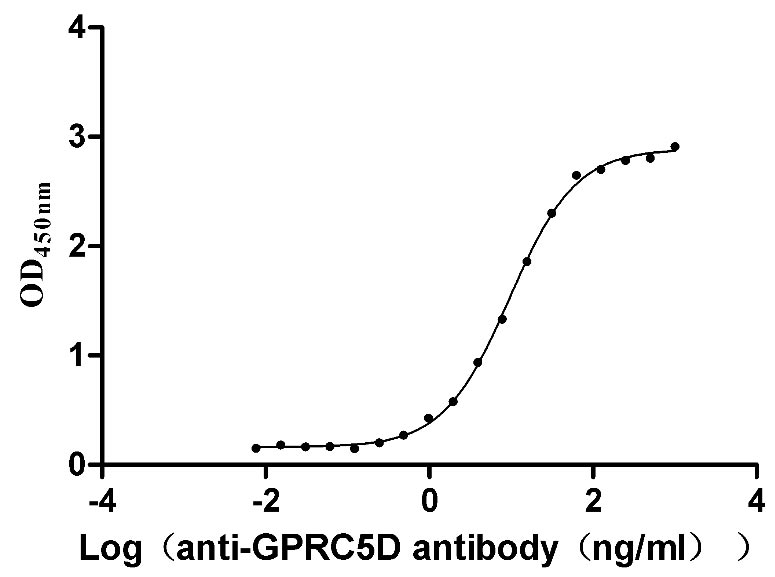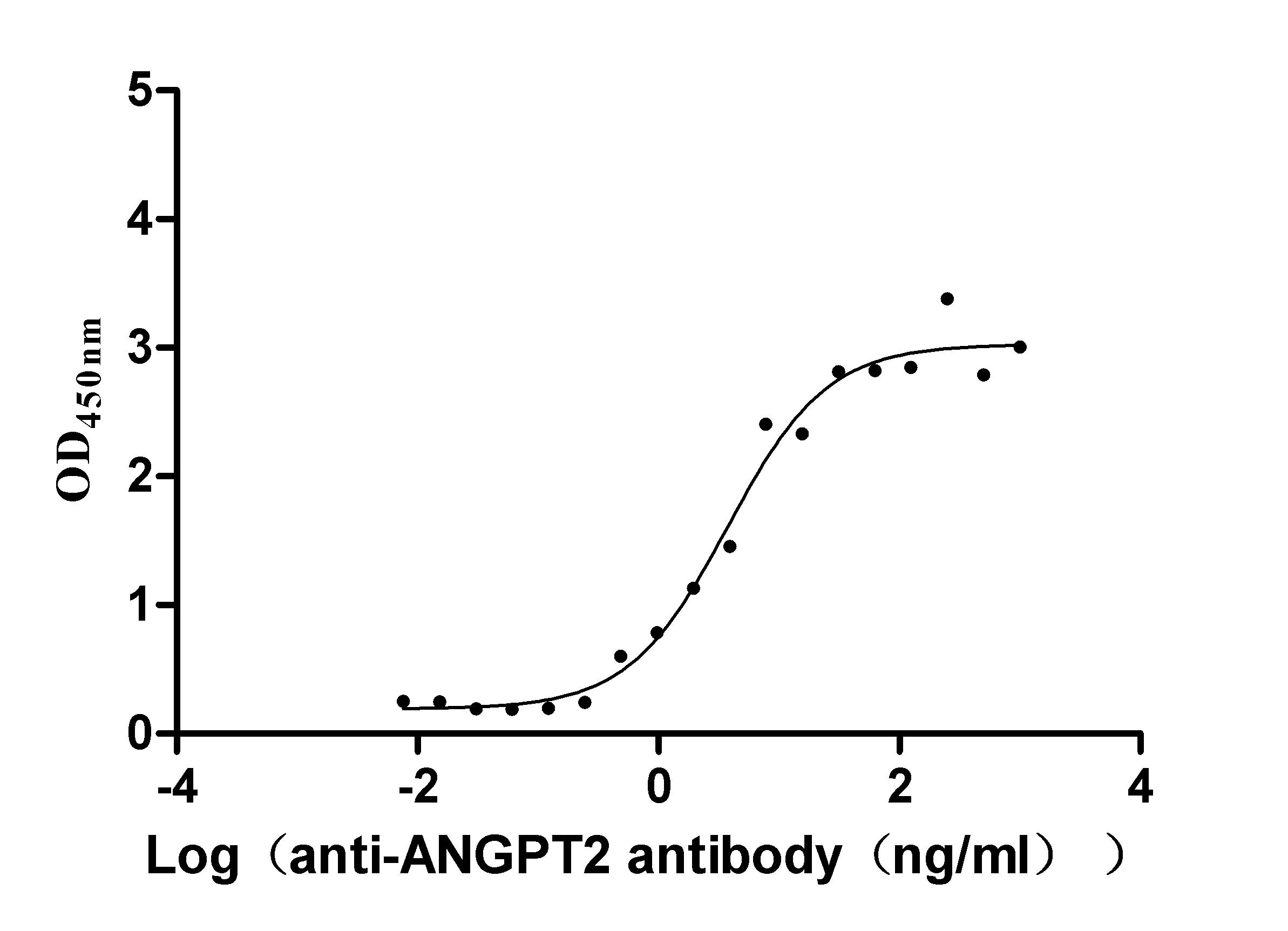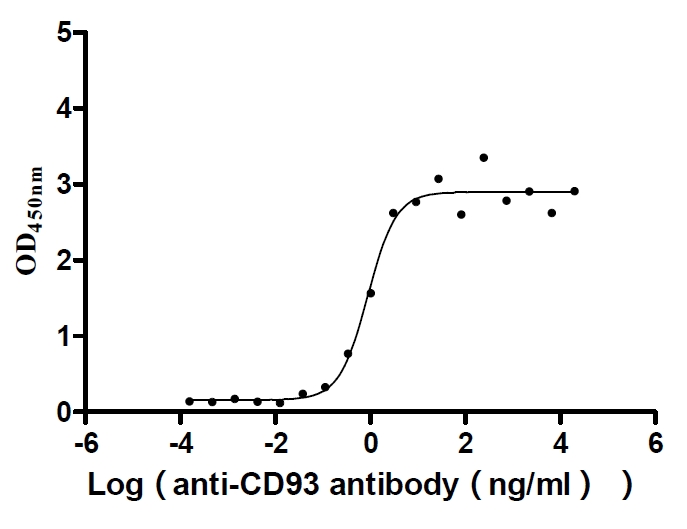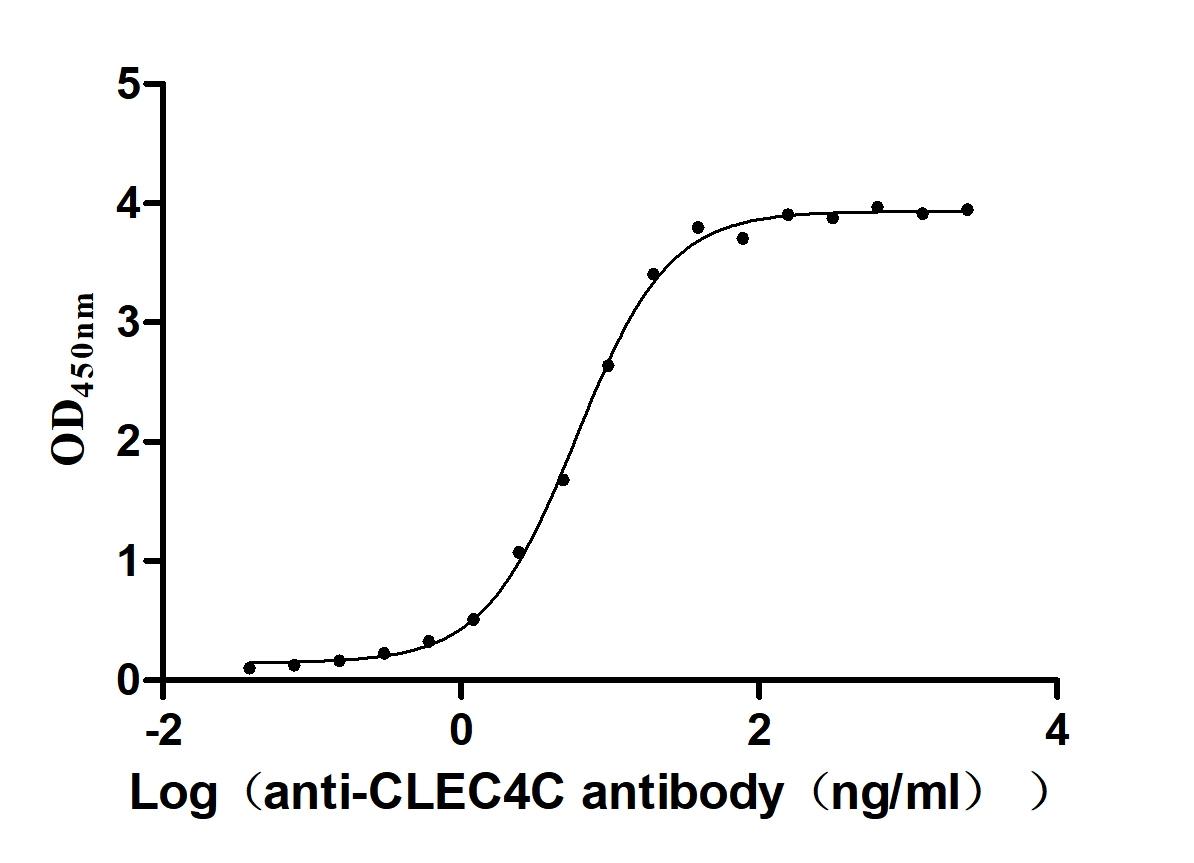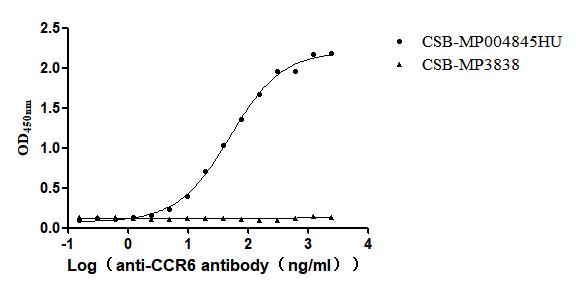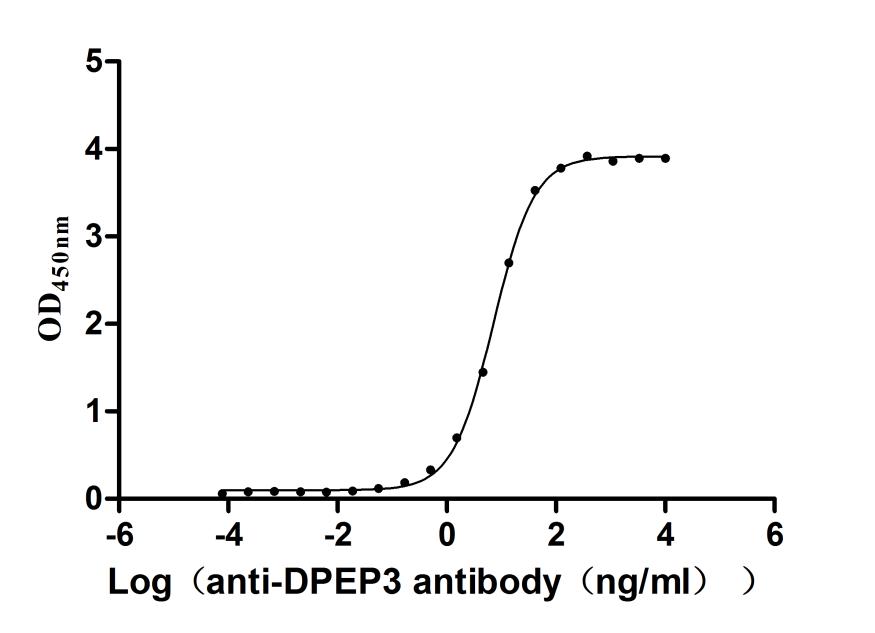Recombinant Human Alpha-galactosidase A (GLA)
In Stock-
中文名称:人GLA重组蛋白
-
货号:CSB-EP009474HU
-
规格:¥1344
-
图片:
-
其他:
产品详情
-
纯度:Greater than 90% as determined by SDS-PAGE.
-
基因名:
-
Uniprot No.:
-
别名:AGAL_HUMAN; Agalsidase alfa; Alpha D galactosidase A; Alpha D galactoside galactohydrolase 1; Alpha D galactoside galactohydrolase; Alpha gal A; Alpha galactosidase A; Alpha-D-galactosidase A; Alpha-D-galactoside galactohydrolase; Alpha-galactosidase A; GALA; Galactosidase; alpha; GLA; GLA protein; Melibiase
-
种属:Homo sapiens (Human)
-
蛋白长度:Full Length of Mature Protein
-
来源:E.coli
-
分子量:49.4kDa
-
表达区域:32-429aa
-
氨基酸序列LDNGLARTPTMGWLHWERFMCNLDCQEEPDSCISEKLFMEMAELMVSEGWKDAGYEYLCIDDCWMAPQRDSEGRLQADPQRFPHGIRQLANYVHSKGLKLGIYADVGNKTCAGFPGSFGYYDIDAQTFADWGVDLLKFDGCYCDSLENLADGYKHMSLALNRTGRSIVYSCEWPLYMWPFQKPNYTEIRQYCNHWRNFADIDDSWKSIKSILDWTSFNQERIVDVAGPGGWNDPDMLVIGNFGLSWNQQVTQMALWAIMAAPLFMSNDLRHISPQAKALLQDKDVIAINQDPLGKQGYQLRQGDNFEVWERPLSGLAWAVAMINRQEIGGPRSYTIAVASLGKGVACNPACFITQLLPVKRKLGFYEWTSRLRSHINPTGTVLLQLENTMQMSLKDLL
Note: The complete sequence including tag sequence, target protein sequence and linker sequence could be provided upon request. -
蛋白标签:N-terminal 6xHis-tagged
-
产品提供形式:Liquid or Lyophilized powder
Note: We will preferentially ship the format that we have in stock, however, if you have any special requirement for the format, please remark your requirement when placing the order, we will prepare according to your demand. -
缓冲液:Tris-based buffer,50% glycerol
-
储存条件:Store at -20°C/-80°C upon receipt, aliquoting is necessary for mutiple use. Avoid repeated freeze-thaw cycles.
-
保质期:The shelf life is related to many factors, storage state, buffer ingredients, storage temperature and the stability of the protein itself.
Generally, the shelf life of liquid form is 6 months at -20°C/-80°C. The shelf life of lyophilized form is 12 months at -20°C/-80°C. -
货期:3-7 business days
-
注意事项:Repeated freezing and thawing is not recommended. Store working aliquots at 4°C for up to one week.
-
Datasheet & COA:Please contact us to get it.
相关产品
靶点详情
-
功能:Catalyzes the hydrolysis of glycosphingolipids and participates in their degradation in the lysosome.
-
基因功能参考文献:
- GLA variants found included R118C (n = 2), D83N, and D313Y (n = 7); IVS6-22 C>T, IVS4-16 A>G, IVS2+990C>A, 5'UTR-10 C>T (n = 4), IVS1-581 C>T, IVS1-1238 G>A, 5'UTR-30 G>A, IVS2+590C>T, IVS0-12 G>A, IVS4+68A>G, IVS0-10 C>T, IVS2-81-77delCAGCC, IVS2-77delC. We found that patients with common heart disease did not contain a substantial number of patients with undiagnosed Fabry disease. PMID: 29227985
- GLA DNA screening protocols starting from the dialysis population and upstream extended to families of affected individuals may be an effective strategy to maximize the early identification of subjects with Fabry disease. PMID: 30099469
- family study with the classical phenotype of Fabry disease due to the novel nonsense mutation c.607G>T (p.E203X) of the GLA gene; the Fabry disease phenotype is highly variable in heterozygote females, even within the same family PMID: 28152533
- It negatively regulates calcification of human aortic valve interstitial cells. PMID: 29653899
- Results from a study on gene variability markers in early-stage human embryos shows that GLA is a putative variability marker for the 3-day, 8-cell embryo stage. PMID: 26288249
- Presence of isolated heterozygous -10C >T SNP is not associated with clinically relevant symptoms or organ manifestations as seen in Fabry disease. PMID: 29794742
- The D313Y variant in the GLA gene was not Fabry disease causative in 2 Danish families. PMID: 29037082
- The mutation p.D313Y in the GLA gene may lead to organ manifestations and elevation of the Fabry-specific biomarker lyso-globotriaosylsphingosine. PMID: 28276057
- Four novel GLA pathogenic mutations are reported and evidence of pathogenicity of the D313Y mutation is provided. PMID: 28988177
- alpha-Galactosidase A genotype N215S does not lead to the development of a classical Fabry phenotype but induces a specific cardiac variant of Fabry disease mimicking nonobstructive hypertrophic cardiomyopathy. PMID: 29018006
- GLA c.196G>C variant is a genetic risk factor for cerebral small-vessel occlusion and non-cardioembolism in Japanese males but not in females. PMID: 28275245
- we presented the clinical characters of a Chinese FD pedigree mimicking familial episodic pain. Furthermore, our finding suggests that a novel double mutation of GLA (c.273_276del TGAT in cis with c.281G>T) is associated with FD PMID: 27531472
- Results showed that most Fabry disease patients carrying GLA IVS4+919A did not show abnormal cardiac phenotypes. The near-absence of GLA IVS4+919A in heart disease cohort suggested that this variant is not a frequent cause of overt heart diseases in Taiwan. PMID: 28377241
- This longitudinal Fabry Registry study analyzed data from patients with Fabry disease to determine the incidence and type of severe clinical events following initiation of enzyme replacement therapy (ERT) with agalsidase beta, as well as risk factors associated with occurrence of these events PMID: 27510433
- alpha-galactosidase A mutation, IVS4-type Fabry disease has features similar to those of classic Fabry disease and a higher frequency of deep white matter hyperintensities and a higher incidence of infarctions and pulvinar signs than in healthy controls PMID: 26869469
- We demonstrate that the wild-type sequence harbors an hnRNP A1 and hnRNP A2/B1-binding exonic splicing silencer (ESS) overlapping the 5'splice site (5'ss) that prevents pseudoexon inclusion.we demonstrate that splice switching oligonucleotide (SSO) mediated blocking of the pseudoexon 3'ss and 5'ss effectively restores normal GLA splicing PMID: 27595546
- Four patients had non-amenable mutant forms of a-Gal based on the validated cell-based assay conducted after treatment initiation and were excluded from primary efficacy analyses only. PMID: 27834756
- Mesenchymal stem cells with reduced GLA activity are prone to apoptosis and senescence due to impaired autophagy and DNA repair capacity. PMID: 28098348
- we review the various types of GLA variants and recommend that pathogenicity be considered only when associated with elevated globotriaosylceramide in disease-relevant organs and tissues as analyzed by mass spectrometry. PMID: 27195818
- findings revealed the alternative splicing mechanism of GLA (IVS4+919G>A), and a potential treatment for this specific genetic type of Fabry disease by amiloride in the future PMID: 28430823
- Results found a novel heterozygous stop codon mutation in exon 1 of the GLA gene in female patients with Fabry Disease with methylation in the non-mutated allele thought to be associated with the clinical severity of the disease. PMID: 28087245
- Study described the demographic data, wide clinical spectrum of phenotypes, and GLA mutation spectrum of Fabry disease in Korea. Most of the patients had classical Fabry disease, with a 4 times higher incidence than that of late-onset Fabry disease, indicating an underdiagnosis of mild, late-onset Fabry disease. PMID: 28723748
- we reviewed other small molecules that were reported to have a stabilizing effect on some GLA missense mutations in vitro and might be developed to act in synergy or as an alternative to 1-deoxygalactonojirimycin PMID: 27916943
- No pathogenic mutations in the coding regions of the GLA gene were identified in this group of patients and thus no Fabry disease was found in this study. PMID: 26981927
- High desphospho-uncarboxylated matrix Gla protein level, reflecting a poor vitamin K status, seems to be associated with kidney damage and may be also a marker of cardiovascular risk in CKD patients PMID: 27100101
- Similar central nervous system manifestations in patients with the IVS4 mutation or classical Fabry mutations. PMID: 28166746
- Case Report: Kidney transplantation from a mother with unrecognized Fabry disease to her son with low alpha-galactosidase A activity. PMID: 26971403
- p.M187R GLA mutation in Fabry disease causes a severe systemic and ophthalmologic phenotype, in both male and female patients. PMID: 28225726
- The results of the current study suggest that the GLA haplotype D313Y does not lead to severe organ manifestations as seen in genotypes known to be causal for classical Fabry disease. PMID: 27059467
- We report a case of Fabry disease with a p.R301X (c.901 C>T) mutation in a 39-year-old man who was being treated for chronic sclerosing glomerulonephritis for 2 years. Family screening tests showed that the proband's mother, sister, and daughter had the same mutation with different phenotypes. PMID: 27156739
- Case Report: hypertrophic obstructive cardiomyopathy with Fabry disease with the GLA E66Q mutation. PMID: 27160240
- We conclude that a mild GLA variant is typically characterized by high residual enzyme activity and normal biomarker levels. We found evidence that these variants can still be classified as a distinctive, but milder, sub-type of FD. PMID: 26415523
- Fabry disease, an X-linked disorder of glycosphingolipids that is caused by mutations of the GLA gene that codes for alpha-galactosidase A, leads to dysfunction of many cell types and includes a systemic vasculopathy. PMID: 26564084
- Study describes 5 novel mutations found in the GLA gene of patients with clinical diagnosis of Fabry disease. PMID: 26691501
- The present study confirms the heterogeneity of mutations in Fabry disease and the importance of molecular analysis for genetic counseling, female heterozygotes detection as well as therapeutic decisions. PMID: 26297554
- GLA gene variations correlate with globotriaosylceramide and globotriaosylsphingosine analog levels in urine and plasma PMID: 26070511
- results directly implicated the GLA mutation p.E66Q as the genetic etiology of the Chinese renal variant FD pedigree. PMID: 26456105
- This study indicated that the p.E66Q variant of GLA does not affect the progression of chronic kidney disease. PMID: 24718812
- Thus, inheritance of the CIH caused an mRNA deregulation altering the GLA expression pattern, producing a tissue glycolipid storage. PMID: 26334996
- data strongly suggest that the GLA p.(Arg118Cys) variant does not segregate with Fabry disease clinical phenotypes in a Mendelian fashion, but might be a modulator of the multifactorial risk of cerebrovascular disease PMID: 25468652
- In Fabry disease patients, the alpha-galactosidase A-10T allele appears to be causal for neurological manifestations. PMID: 25423912
- Some clinical cases of some members of a Sicilian family to express phenotypical variability of Anderson-Fabry disease in subjects with the same genetic mutation in alpha galactosidase A gene, are reported. PMID: 25281798
- Case Report: immunohistologically detected synaptopodin upregulation in foamy podocytes in Fabry disease due to novel alpha-galactosidase A mutation. PMID: 25295576
- These data confirmed that the specific approach can effectively contribute to the identification of pathological mutations in GLA. PMID: 25382311
- The novel mutation p.M187R/g7219 T>G is associated with a particularly malignant cardiac phenotype in males and females over 40 years. PMID: 24679964
- OC follows a gene duplication strategy while MGP variability was obtained mostly by the use of multiple promoters and alternative splicing, leading to proteins with additional functional characteristics and alternative gene regulatory pathways. [review] PMID: 25068814
- It is clear that a certain intronic haplotype in males with cryptogenic stroke is associated with reduced GLA expression and function. PMID: 25101867
- GLA p.E66Q mutation is a genetic risk factor for cerebral small-vessel occlusion in elderly Japanese PMID: 23724928
- residues important for expression of the GLA activity PMID: 24386359
- A Fabry disease patient and his daughter had the mutation c.493 G > C in the 3d exon of the GLA gene. D165H substitution affects protein folding. This highly conserved AA may be a key amino acid for enzyme functionality. PMID: 24398019
显示更多
收起更多
-
相关疾病:Fabry disease (FD)
-
亚细胞定位:Lysosome.
-
蛋白家族:Glycosyl hydrolase 27 family
-
数据库链接:
HGNC: 4296
OMIM: 300644
KEGG: hsa:2717
STRING: 9606.ENSP00000218516
UniGene: Hs.69089
Most popular with customers
-
Recombinant Human Tumor necrosis factor receptor superfamily member 1A (TNFRSF1A), partial (Active)
Express system: Mammalian cell
Species: Homo sapiens (Human)
-
Recombinant Human Plexin-B1 (PLXNB1), partial (Active)
Express system: Mammalian cell
Species: Homo sapiens (Human)
-
Recombinant Human G-protein coupled receptor family C group 5 member D (GPRC5D)-VLPs (Active)
Express system: Mammalian cell
Species: Homo sapiens (Human)
-
Recombinant Dog Angiopoietin-2 (ANGPT2) (Active)
Express system: Mammalian cell
Species: Canis lupus familiaris (Dog) (Canis familiaris)
-
Recombinant Human Complement component C1q receptor (CD93), partial (Active)
Express system: Mammalian cell
Species: Homo sapiens (Human)
-
Recombinant Macaca fascicularis C-type lectin domain family 4 member C(CLEC4C), partial (Active)
Express system: Mammalian cell
Species: Macaca fascicularis (Crab-eating macaque) (Cynomolgus monkey)
-
Recombinant Human C-C chemokine receptor type 6(CCR6)-VLPs (Active)
Express system: Mammalian cell
Species: Homo sapiens (Human)
-
Recombinant Human Dipeptidase 3(DPEP3), partial (Active)
Express system: Mammalian cell
Species: Homo sapiens (Human)

